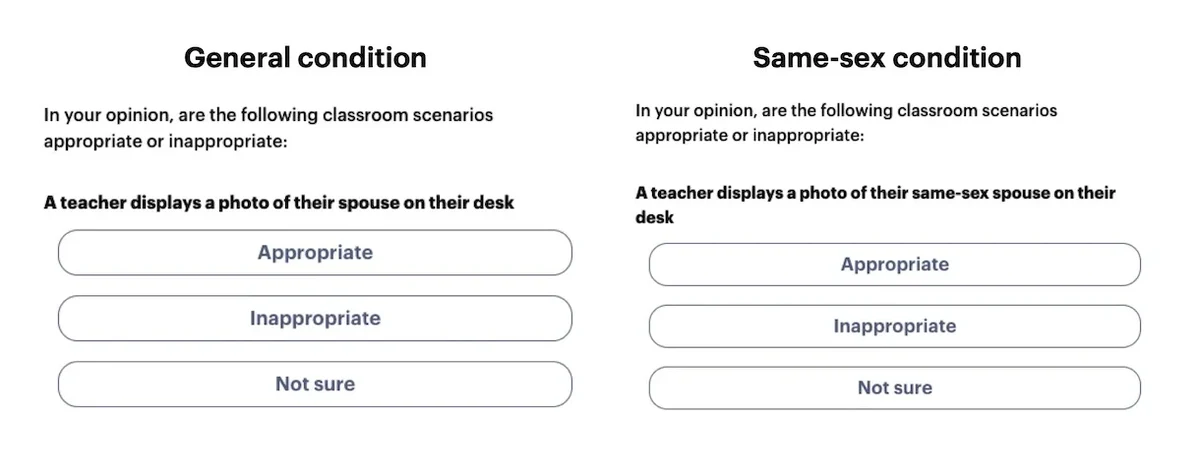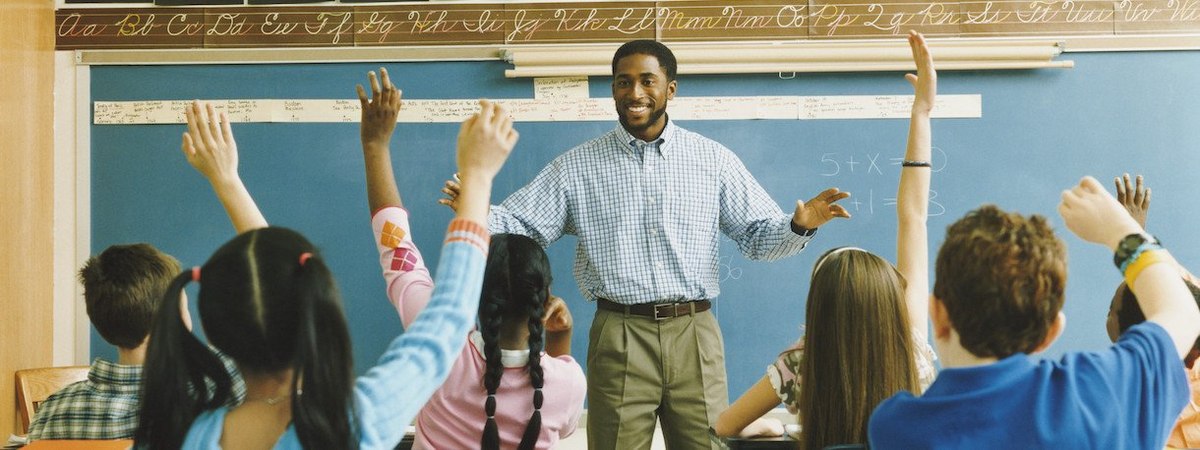Republican lawmakers in several U.S. states have passed or are currently considering legislation that would ban classroom instruction on sexual orientation and gender identity for children of certain grade levels. In a recent poll, YouGov asked Americans their opinions on components of Florida’s “Parental Rights in Education” law, which some critics call the “Don’t Say Gay” law, as well as their views on the appropriateness of different scenarios involving gay, lesbian, and transgender fictional characters and teachers.
Americans are slightly more likely to support (44%) than oppose (41%) banning public school teachers from providing classroom instruction on sexual orientation and gender identity to children in kindergarten through third grade. People are also more likely to support (47%) than oppose (38%) allowing parents to sue a school district if they believe classroom instruction on sexuality and gender is not age-appropriate according to state standards. Democrats are more likely to oppose than to support both of these provisions, while Republicans and Independents are more likely to support them than to oppose them.
While proponents say these laws are designed to ensure that children only receive information that is age-appropriate, opponents argue that the implications will be much more far-reaching. One concern in Florida is that the law’s vaguely worded language may have a chilling effect on the speech of gay, lesbian, and transgender teachers and students, discouraging them from openly discussing their families and relationships.
Although the bills generally don’t specify which sexual orientations are restricted from classroom instruction, a recent YouGov survey shows Republicans have particular concerns about same-sex relationships. In an experiment, YouGov found that Republicans are far less likely to say they find appropriate certain classroom scenarios – including a teacher displaying a photo of their spouse or talking about their wedding – when the question specifies that the teacher is in a same-sex relationship. We also found that nearly half of Republicans believe the homophobic theory, recently promoted by right-wing media, that gay and lesbian teachers are “grooming” schoolchildren for abuse.
The experiment, designed to understand whether situations are deemed inappropriate in general or only when involving same-sex relationships, presented respondents with three scenarios and asked whether each scenario was “appropriate” or “inappropriate.” Half of survey respondents were shown situations that did not specify the sexual orientation of the teacher or fictional character involved in them — we call this the general condition of the experiment. The other half were shown scenarios that indicated the person involved was in — or interested in — a same-sex relationship. We refer to this as the same-sex condition. For example:
The survey found that a majority of Americans say it is appropriate for a teacher to display a photo of their spouse on their desk (60%) and for them to tell students that they were recently married (65%). However, when the scenario specifies that the teacher’s spouse is of the same sex, far fewer approve: 44% say it’s appropriate for a teacher to display a photo of their same-sex spouse on their desk and 36% say it’s appropriate for them to tell students about their recent wedding.

The gap was smaller, though still significant, for the third scenario asked about – a situation in which a teacher reads students a book about a child who has a crush on another child. In the general condition, 37% say this is appropriate; in the same-sex condition, only 30% say it is appropriate.
Compared to Democrats, Republicans are far less likely to accept teachers’ behavior when it involves a same-sex relationship. While over half of Republicans (54%) say it’s appropriate for a teacher to display a photo of their spouse on their desk, only a quarter (24%) say it’s appropriate when the question specifies that the teacher is in a same-sex relationship. About half of Republicans (53%) also say it’s appropriate for a teacher to tell students that they were recently married, yet only 12% say it’s appropriate if the teacher married someone of the same sex. One-quarter of Republicans (25%) say it's appropriate for a teacher to read students a book about a student having a crush, while only 8% say it's appropriate if the crush is on a child of the same gender.
While Democrats also are less likely to say the same-sex scenarios were appropriate relative to the general ones, the gap is far more modest (6 percentage points for the photo scenario compared to 30 for Republicans, 22 percentage points for the marriage scenario compared to 41, and 10 percentage points for the book scenario compared to 17). Democrats also are more supportive of each of these scenarios in general, and more likely to find each one appropriate even when they know it involves same-sex scenarios than Republicans are when sexual orientation isn’t specified.
We also asked Americans their opinions on the appropriateness of several TV-show themes or plotlines for children of different ages. For children 10 to 14, people are more likely to say it is appropriate rather than inappropriate for shows to involve characters with same-sex parents, characters who are gay or lesbian, and characters who are transgender. For children under 10, Americans are more likely to say it would be inappropriate for a show to feature a gay, lesbian, or transgender character, or for the character to have same-sex parents.
What is motivating the recent push for legislation banning discussions of gender and sexuality in schools? A spokesperson for Florida Governor Ron DeSantis recently tweeted that Florida’s classroom ban on gender and sexuality-related topics could be accurately described as an “anti-grooming bill.” Panic over “grooming,” which refers to the idea of exposing young children to explicit material in order to prime them for sexual abuse, has recently been used to justify laws restricting the type of material that can be taught or discussed in classroom settings. While the laws themselves don’t target specific groups, many opponents say the legislators proposing them are reviving homophobic tropes insinuating that gay and lesbian people are child predators.
Our poll asked Americans whether they think it is true or false that “gay and lesbian public school teachers are trying to recruit children to the gay and lesbian lifestyle and prey on them sexually.” Over half of U.S. adult citizens (56%) say this statement — which is not supported by evidence — is probably or definitely false, while 29% say it is probably or definitely true. Responses vary based on party identity: While nearly half of Republicans (48%) say this is probably or definitely true, only 16% of Democrats agree. Younger Americans – despite being more likely to identify as Democrats — are more likely to say they believe in the unfounded grooming theory than are Americans 45 and older. Parents of children under 18 are more likely to believe this theory than are people without children under 18.
See the toplines and crosstabs from this U.S. News Poll
Methodology: This U.S. News survey was conducted by YouGov using a nationally representative sample of 1,000 U.S. adult citizens interviewed online between April 5 - 8, 2022. This sample was weighted according to gender, age, race, and education based on the 2018 American Community Survey, conducted by the U.S. Census Bureau, as well as news interest and 2020 Presidential votes (or non-votes). Respondents were selected from YouGov’s opt-in panel to be representative of all U.S. citizens. The margin of error is approximately 4% for the entire sample.
Image: Getty















